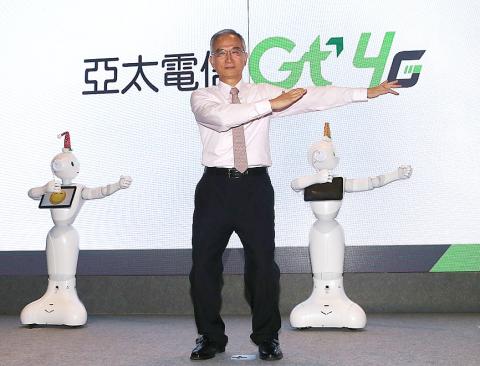Asia Pacific Telecom Co (APT, 亞太電信) yesterday said that it is mulling selling Japanese telecom Softbank Corp’s Pepper humanoid robots in Taiwan next year in an effort to expand its value-added services.
The robot, developed by Softbank and Hon Hai Precision Industry Co (鴻海精密), yesterday made its Taiwanese debut at Asia Pacific’s flagship store in the Syntrend Creative Park (三創).
“Pepper’s first appearance is supported by Softbank... We are training the robot to speak Chinese and working on Japanese-Chinese romanization of the applications,” Asia Pacific chairman Lu Fang-ming (呂芳銘) told reporters. “We need to work with local application developers to build a bigger knowledge base for Pepper so that it can be used in different industries.”

Photo: CNA
In Japan, Nestle cafe use Peppers to sell coffee and the robots also help telecoms sell their services, Lu said.
In Taiwan, Asia Pacific aims to expand the services to education and as a companion to elderly people, he said.
Asia Pacific is to partner with Syntrend and hold a contest to develop applications for the robots that are suitable for local industries, Syntrend chairman Jeff Gou (郭守正) said yesterday.
Gou Shou-cheng is the son of Hon Hai chairman Terry Gou (郭台銘).
Asked when the robots would be available in Taiwan, Lu said: “We hope to introduce Pepper to the Taiwanese market as soon as possible, but we need more time to build a knowledge-based software platform for human-robot interactions.”
“We will strive to” sell the robot next year, he said.
It took about a year for Softbank to ship Pepper robots after their launch, Lu said.
“A lot of companies in different industries have expressed an interest in Pepper,” he said.
On Thursday, Taiwan Mobile Co (台灣大哥大) president James Jeng (鄭俊卿) said he was very interested in the humanoid robot and hoped to hire some for use at the company’s stores.
Commenting on Asia Pacific’s business outlook for next year, Lu said the company aims to double the number of its 4G subscribers from this year’s 700,000 by luring subscribers from local rivals.
Lu said the company’s capital spending next year would be on par with this year’s NT$6 billion (US$181.81 million) and most would be used to deploy small cell base stations for its newly acquired 4G 2.6-gigahertz bandwidth.
The new 4G network is set to start commercial operations in the second quarter of next year, he said.
Asia Pacific also plans to invest an unspecified amount on developing 5G technology next year and the year after, Lu said.
The company aims to expand its 5G workforce to 200 people from more than 100 and it is also working with other institutions to develop 5G technology, he said.
He expects 5G networks to start commercial operations in 2020 in line with most global telecoms’ expectations.

Real estate agent and property developer JSL Construction & Development Co (愛山林) led the average compensation rankings among companies listed on the Taiwan Stock Exchange (TWSE) last year, while contract chipmaker Taiwan Semiconductor Manufacturing Co (TSMC, 台積電) finished 14th. JSL Construction paid its employees total average compensation of NT$4.78 million (US$159,701), down 13.5 percent from a year earlier, but still ahead of the most profitable listed tech giants, including TSMC, TWSE data showed. Last year, the average compensation (which includes salary, overtime, bonuses and allowances) paid by TSMC rose 21.6 percent to reach about NT$3.33 million, lifting its ranking by 10 notches

Popular vape brands such as Geek Bar might get more expensive in the US — if you can find them at all. Shipments of vapes from China to the US ground to a near halt last month from a year ago, official data showed, hit by US President Donald Trump’s tariffs and a crackdown on unauthorized e-cigarettes in the world’s biggest market for smoking alternatives. That includes Geek Bar, a brand of flavored vapes that is not authorized to sell in the US, but which had been widely available due to porous import controls. One retailer, who asked not to be named, because

SEASONAL WEAKNESS: The combined revenue of the top 10 foundries fell 5.4%, but rush orders and China’s subsidies partially offset slowing demand Taiwan Semiconductor Manufacturing Co (TSMC, 台積電) further solidified its dominance in the global wafer foundry business in the first quarter of this year, remaining far ahead of its closest rival, Samsung Electronics Co, TrendForce Corp (集邦科技) said yesterday. TSMC posted US$25.52 billion in sales in the January-to-March period, down 5 percent from the previous quarter, but its market share rose from 67.1 percent the previous quarter to 67.6 percent, TrendForce said in a report. While smartphone-related wafer shipments declined in the first quarter due to seasonal factors, solid demand for artificial intelligence (AI) and high-performance computing (HPC) devices and urgent TV-related orders

MINERAL DIPLOMACY: The Chinese commerce ministry said it approved applications for the export of rare earths in a move that could help ease US-China trade tensions Chinese Vice Premier He Lifeng (何立峰) is today to meet a US delegation for talks in the UK, Beijing announced on Saturday amid a fragile truce in the trade dispute between the two powers. He is to visit the UK from yesterday to Friday at the invitation of the British government, the Chinese Ministry of Foreign Affairs said in a statement. He and US representatives are to cochair the first meeting of the US-China economic and trade consultation mechanism, it said. US President Donald Trump on Friday announced that a new round of trade talks with China would start in London beginning today,